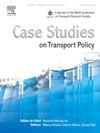Evaluating the congestion-reducing effects of road rationing policy: Evidence from Jakarta’s odd-even policy
IF 2.4
Q3 TRANSPORTATION
引用次数: 0
Abstract
Travel demand restriction policies are becoming popular to reduce traffic jams in heavily congested urban areas. This paper evaluates the short-term impact of the odd–even number plate policy – a form of travel demand restriction –using Google Maps data on traffic congestion in Jakarta, one of the world’s most congested cities. The estimation result of hourly travel time data at road section levels shows that the odd–even policy statistically significantly reduced travel time by 3.0%, on average, during the first month of its implementation. The effect was higher – about 10% during the weekend and the weekly afternoon peak hours. The estimates were robust across various specifications, and no effect was found when looking for travel speed changes in untreated parts of the road network. This study also suggests that road users are likely to depart early in the morning to avoid the policy. The effect seems stagnant after the fourth week of the policy’s introduction. This study suggests that the odd–even number plate policy alone would be ineffective for the traffic congestion reduction agenda in Jakarta’s urban environment.
求助全文
约1分钟内获得全文
求助全文

 求助内容:
求助内容: 应助结果提醒方式:
应助结果提醒方式:


